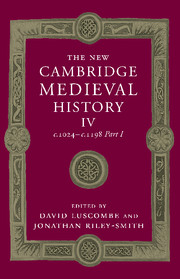Book contents
- Frontmatter
- 1 Introduction
- 2 The Rural Economy and Demographic Growth
- 3 Towns and the Growth of Trade
- 4 Government and Community
- 5 The Development of Law
- 6 Knightly Society
- 7 War, Peace and the Christian Order
- 8 The Structure of the Church, 1024–1073
- 9 Reform and the Church, 1073–1122
- 10 Religious Communities, 1024–1215
- 11 The Institutions of the Church, 1073–1216
- 12 Thought and Learning
- 13 Religion and the Laity
- 14 The Crusades, 1095–1198
- 15 The Eastern Churches
- 16 Muslim Spain and Portugal: Al-Andalus and its Neighbours
- 17 The Jews in Europe and the Mediterranean Basin
- 18 Latin and Vernacular Literature
- 19 Architecture and the Visual Arts
- List of Primary Sources
- Bibliography of secondary works arranged by chapter
- Index
- Frontispiece">
- Plate section"
- References
6 - Knightly Society
Published online by Cambridge University Press: 28 March 2008
- Frontmatter
- 1 Introduction
- 2 The Rural Economy and Demographic Growth
- 3 Towns and the Growth of Trade
- 4 Government and Community
- 5 The Development of Law
- 6 Knightly Society
- 7 War, Peace and the Christian Order
- 8 The Structure of the Church, 1024–1073
- 9 Reform and the Church, 1073–1122
- 10 Religious Communities, 1024–1215
- 11 The Institutions of the Church, 1073–1216
- 12 Thought and Learning
- 13 Religion and the Laity
- 14 The Crusades, 1095–1198
- 15 The Eastern Churches
- 16 Muslim Spain and Portugal: Al-Andalus and its Neighbours
- 17 The Jews in Europe and the Mediterranean Basin
- 18 Latin and Vernacular Literature
- 19 Architecture and the Visual Arts
- List of Primary Sources
- Bibliography of secondary works arranged by chapter
- Index
- Frontispiece">
- Plate section"
- References
Summary
the warrior order
At the beginning of the eleventh century, Bishop Adalbero of Laon expressed, in a famous formula, the ecclesiastical theory of western Christian society, formed in the image of the celestial realities. The ‘House of God’, he said, which was believed to be one, was in reality three, because in it three categories of men performed three distinct functions: the first prayed, the second fought and the third worked.
For the ecclesiastics of the period – whose opinions are the only ones to have come down to us – this phrase expressed the conception of a society which was immutable since willed by God. ‘Those who pray’ (the oratores) clearly came first, since they served as intermediaries between God and His creatures, for whom they translated His will, or interceded by their liturgies or their prayers, before His throne. The third category, those who toiled and sweated in manual labour (the laboratores), still consisted almost entirely of peasants who, by tilling the soil, fed everyone. The growth of towns, one of the chief features of the period under discussion, would add artisans and workers, while the rise of the commercial bourgeoisie would pose the difficult problem of how to insert merchants into an ideological model which had made no provision for them.
Keywords
- Type
- Chapter
- Information
- The New Cambridge Medieval History , pp. 148 - 184Publisher: Cambridge University PressPrint publication year: 2004
References
- 1
- Cited by

